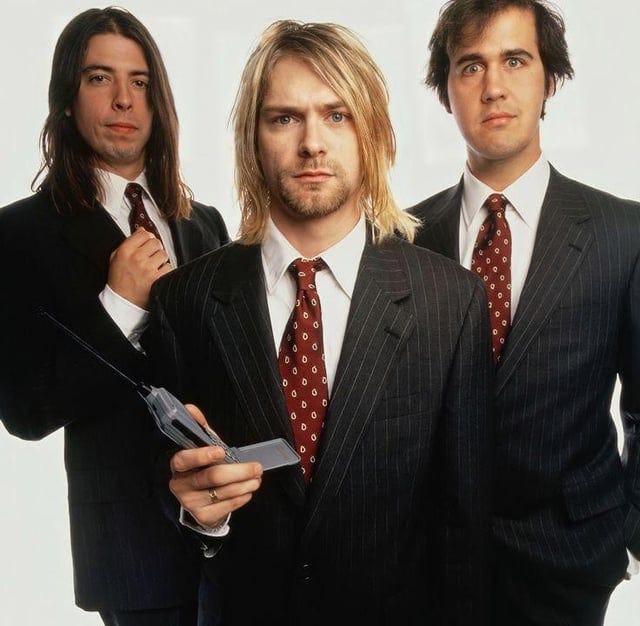Calling all Nirvana fans…
But first a disclaimer: I’m not the Nirvana expert. Nor do I want to be.
We all love “Nevermind” and “In Utero.” If you’re like me, you ping-pong between the two. I don’t always listen to Nirvana, but every few years I find myself drifting back to them. Re-upping my membership. Do I really remember them that well? Did I ever achieve expert-level status? What am I forgetting?
Inevitably, I’m forgetting “Bleach.” How many times have I really listened to it from start to finish? I like a few songs off of it, right? The band’s Sub Pop debut might be the record to revisit after all.
For quick context, I’ve loved Nirvana since forever. I was born a year after Kurt died, but I spent most of my conscious life hearing them. By junior high, I had a better sense of their influence. I spent my high school years rejecting new music and exploring the 1990s. This included my alt/grunge years and a renewed love of Nirvana. And again, I listened to “Nevermind” and “In Utero.” I listened to “Bleach” maybe once or twice, but I neglected it. I’ve since found that it deserves much more attention.
It captures the band in a more lo-fi environment. One could call it dirtier, grungier, and/or more indie sounding than their latter records. For many people, that kind of sound is exactly what they want. You could argue that Steve Albini’s production on “In Utero” was a more refined (and expensive) return to that sort of grittiness.
But, the lineup was different than the one we know from iconic photoshoots such as this one.
Before the band settled on Dave Grohl, they cycled through a smattering of drummers. Chad Channing was the main drummer on “Bleach.” By the time “Nevermind” came around, he was gone and Dave was in. Chad was no slouch despite living in the shadow of Dave. Dave was arguably the drummer of the 1990s, but Chad made his mark. In fact, he could hit the shit out of the drums.
Chad’s influence didn’t disappear either. On the song “In Bloom,” he’s generally given credit for the drum sound (the band played it before Dave). At Nirvana’s induction ceremony, Dave even shouted out Chad’s contribution to the “Nevermind” hit.
My favorite track from the album is “School.” It’s one of Kurt’s most simple lyrics, but it packs a serious punch. The guitar work also stands out. For a recent charity concert supporting L.A. Wildfire fire victims, the remaining band members (including former touring guitarist Pat Smear) performed the song live with Kim Gordon.
I also found myself enjoying the darker track “Paper Cuts.” Not only is the subject matter haunting, the song features some of Kurt’s best screeches. This time around, Melvins drummer Dale Crover played the drums. Ok, so it wasn’t just Chad either. To top it all off, guitarist Jason Everman was on the cover (but he didn’t play on the album).
The album’s two singles are also great. “Love Buzz” is the Shocking Blue cover with Krist’s notable bass line. The band shows that they can do covers and it wouldn’t be their last. On the other single “Blew,” Krist turns up the sludge for another chunky bass part. Another grungy rocker with a memorable riff. They must’ve loved “Blew” in particular because they still played it years later for “Live and Loud.”
There’s also worthy deep cuts like “Negative Creep,” “Floyd the Barber,” or “Swap Meet,” but let’s not forget the early favorite “About a Girl.” The latter track re-appeared on the band’s “Unplugged in New York” album. Both electric and acoustic, the power of Kurt’s lyrics shine through.
As for hidden gems, you should try out the riff-tastic majesty of Mr. Moustache. It’s the kind of song, along with many others on this album, that you wish more people would talk about. You could argue that many alt, grunge, or even metal heads can find something to love here. All are welcome.
Sub Pop also earns a shout out for being the label. While Nirvana later upgraded to Geffen-controlled DGC Records, the Seattle outfit deserves mention for their influence on alternative and Washington-based music. Without them, Nirvana and other bands like Soundgarden might have had completely different careers. That’s not even counting the bands they’ve cultivated since.
You could easily call this a formative record. Some might skip it all together. But, you have to give the band props for their early experiments. Their later albums became more slick, detailed, and put together. This one finds the band younger, unfiltered, and as heavy as they’d ever be. My return visits have always paid dividends.
It’s not their best record. It’s also not a perfect one. Even then, there’s still something charming and disarming about “Bleach.”
Thanks for reading! I’ll be back for the typos.
P.S. What’s your favorite track off of “Bleach?”




